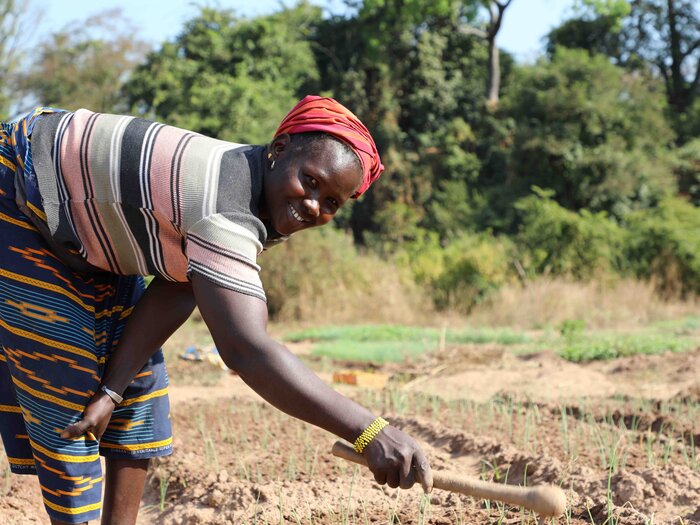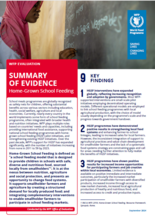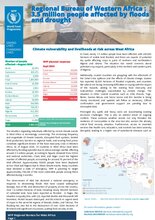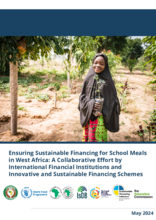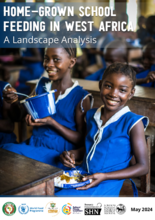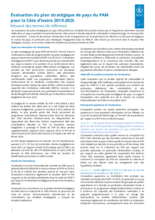Côte d'Ivoire
- 34.8%
- of people live below the poverty line of US$1.22 per day
- 30%
- of people north and central-west are stunted (impaired development due to malnutrition)
- 29.4 million
- population
Political stability has paved the way for strong economic growth in Côte d'Ivoire over the past decade, with increased investment in basic social services and a reduction in poverty.
Despite progress, challenges such as food insecurity, malnutrition and gender inequalities persist, with over a third of people still living below the poverty line.
The Government’s five-year National Development Plan aims to transform the country into a middle-income economy by 2030. It focuses on advancing the nation’s human capital, which includes improving people’s health and skills.
Northern Côte d'Ivoire is affected by the spillover of the crisis in the Central Sahel, particularly conflict and instability in Burkina Faso. According to UNHCR, over 67,000 asylum seekers have fled into Bounkani and Tchologo regions. The majority of these are women and children.
Most asylum-seekers arrive with meagre belongings if any and have very limited access to livelihoods opportunities. A total 19 percent of this population is settled in two transit sites of Timala (Bounkani region) and Niornigué (Tchologo region), set up by the Government in July 2023, while the remaining 81 percent settled outside the sites within the host communities. This growing influx creates additional pressure on meagre resources and exacerbates food insecurity among both asylum seekers and poor host communities.
The World Food Programme (WFP) is placing an increased focus on capacity building, to ensure that programmes can be owned by the Government and communities. WFP activities in Côte d’Ivoire also encompass life-saving operations, resilience-building activities, climate adaptative programming, and institutional system strengthening.
What the World Food Programme is doing in Côte d'Ivoire
-
Emergency response
-
In response to the influx of asylum seekers from Burkina Faso, WFP provides up to 30,000 asylum seekers with monthly cash assistance to cater for their immediate food needs. WFP also assists almost 800 vulnerable families from host communities, providing quarterly cash transfers. WFP monitoring has shown that asylum seekers use almost all the cash for food. WFP also works in preventing moderate acute malnutrition, through the direct distribution of specialized nutritious to pregnant and breastfeeding women-girls and children between 6 and 59 months, and complementary nutrition activities such as promotion of breastfeeding, nutrition awareness and cooking demonstrations. In addition, WFP supports emergency preparedness both at interagency and national levels, including through training in early warning, response, warehouse management and targeting.
-
School meals
-
WFP provides nutritious school meals to over 145,000 children. The programme involves an integrated package that includes the promotion of health and nutrition at school level, improved access to water and sanitation, literacy support for children with learning difficulties, and support to women smallholder farmer groups. WFP is committed to ensuring the sustainability of the national school meals programme in Côte d'Ivoire by advancing a home-grown school feeding approach through the national school feeding strategy. This involves strengthening food systems by building the capacity of government staff and equipping smallholder farmers (who are mostly women) with seeds, tools, and machinery to improve their food production, processing, and distribution capabilities. By reinforcing these local supply chains, WFP supports local economies and ensures a consistent supply of nutritious food for school meals. In addition, WFP empowers women through tailored training and enhanced access to economic resources like savings and loans, enabling them to play a more active role in the food system. By boosting women’s financial independence and market participation, WFP strengthens community-driven, sustainable food systems that contribute to the long-term success of the national school meals programme and resilience of the communities.
-
Nutrition
-
WFP contributed to the government’s revision of the National Multisectoral Plan for Nutrition and its implementation. WFP led several studies that resulted in the development and approval of the national food fortification strategy. WFP also provided support to the private sector to reach international standards for the production of locally fortified rice.
-
Resilience building
-
WFP provides technical training in stock, warehouse and post-harvest management to smallholder farmers, as well as equipment and machinery. This contributes to increased agricultural production, reduced post-harvest losses and improved market access. WFP also reduces the impact of climate change, for example through early warning and climate monitoring, climate insurance, and the promotion of smart agricultural practices –targeting primarily women and youth in rural areas.
-
Capacity strengthening
-
WFP supports the Ministry of Agriculture in monitoring food security. WFP also partners with the Ministry of Health to provide capacity strengthening, including in areas such as warehouse inventory and stock management, as well as emergency response. WFP works with the Directorate for Pharmaceutical Activities on supply chain data analytics, to improve planning and decision-making.
-
Supply chain
-
WFP provides UN agencies, the Government and other partners with on-demand services including storage, and the buying of food and non-food items, for UN and NGO partners. WFP also facilitates the receiving and transport of food from the port of Abidjan for humanitarian operations in Burkina Faso, positioning Côte d’Ivoire as a secured corridor for the region.
In focus
Côte d'Ivoire news releases
Go to pagePartners and Donors
Find out more about the state of food security in Côte d'Ivoire
Visit the food security analysis pageOperations in Côte d'Ivoire
Contacts
Office
CCIA-BAD, 4th floor 01 BP 1747 Abidjan 01, Côte d’Ivoire
Abidjan Plateau
Côte d’Ivoire

